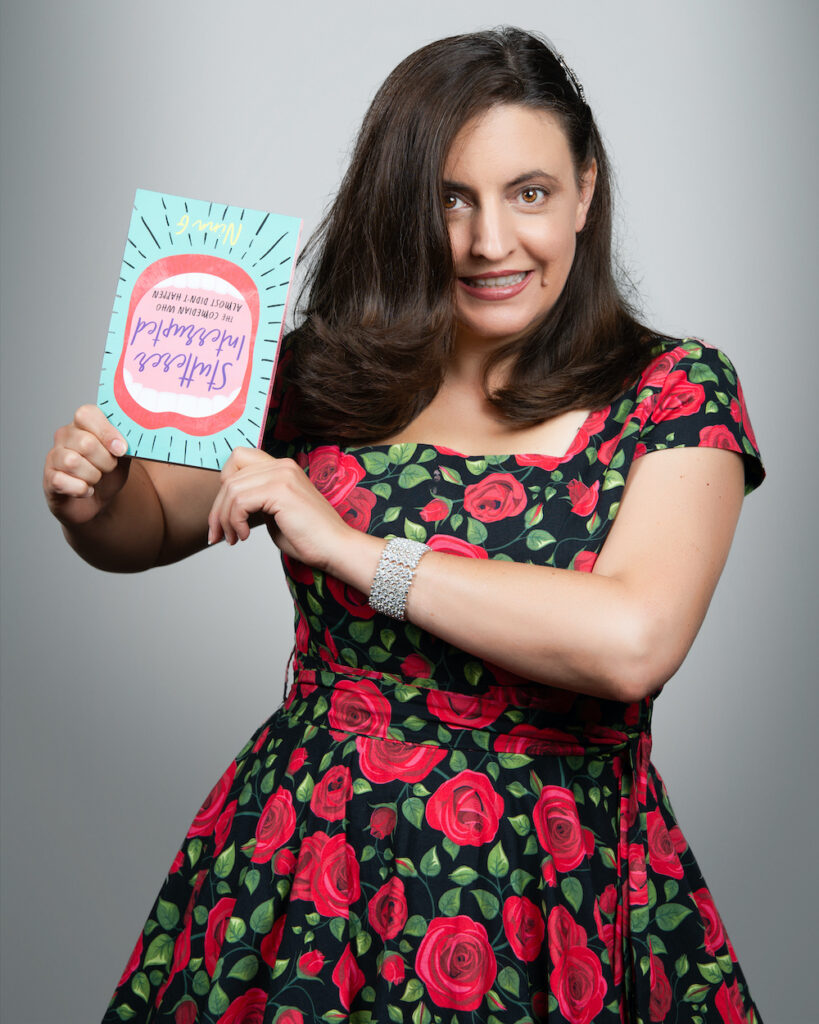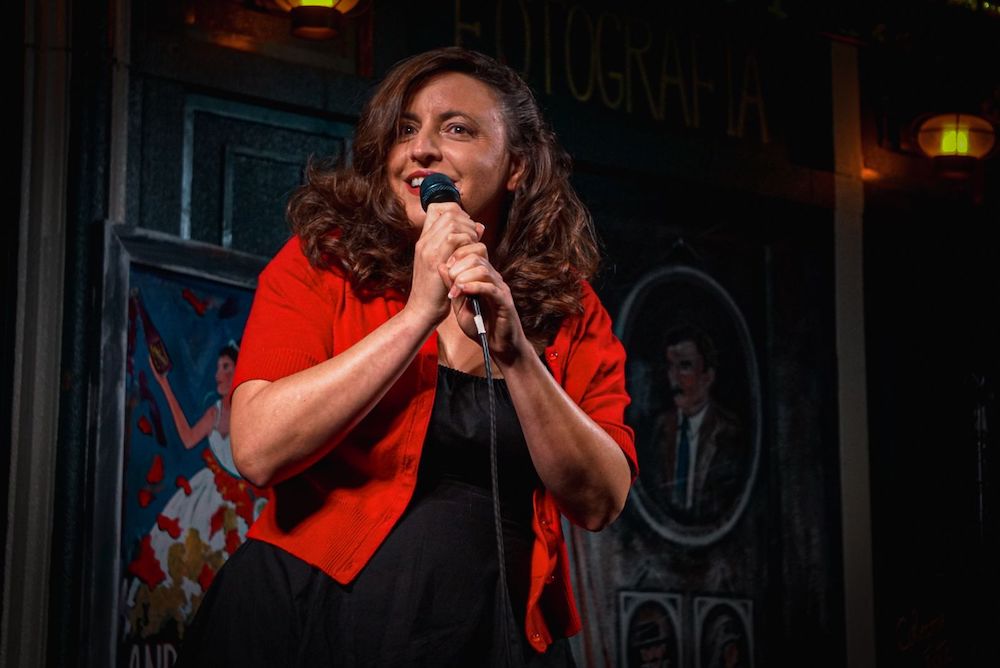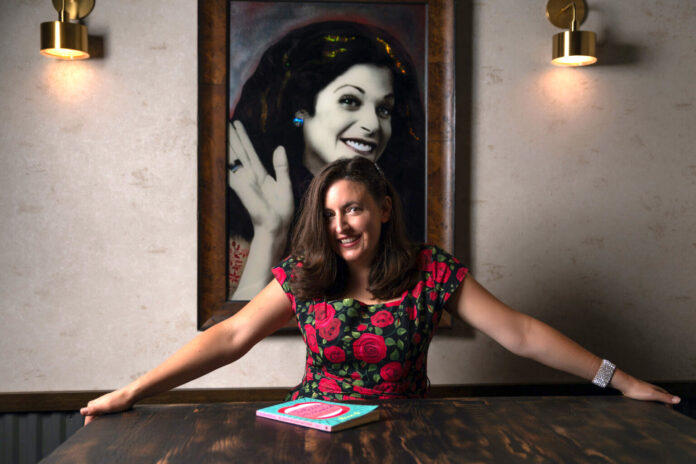People can be real dicks to folks who stutter, but Nina G saves her comebacks for the stage. The entertainer and author, who was likely the sole stuttering woman comic when she first stepped onto a stage in 2010, can’t waste her time on, say, the guy at her favorite sandwich shop who tried to come for herala for stuttering on her first name. (Through no one stutters alike, Nina finds the bilabial sounds of n’s and m’s particularly pesky.) But she will sure as hell channel the annoyance he caused in her act—to the delight of her audience.
And up there in the spotlight, Nina G is definitely not avoiding the words that trigger her speech disability. On her debut comedy album Stutterer Interrupted (which comes out Thu/11) recorded at Alameda Comedy Club, she spins out a yarn around “mediocre minestrone” and “namaste,” stuttering copiously—only to pile on the punchlines by immediately asserting, “that was a stuttering triple axel.”
This is a woman who is done shrinking herself. Even as a kid, Nina was obsessed with comics like Richard Pryor, Emo Philips, and Eddie Murphy, and would play hooky from disillusioning school years with her mom to check out her fave funny folks at the movies. But Nina went from calling up Bay Area comedy clubs to see if they’d allow underage yucksters to giving up on her dream by the time she was legal, convinced that the world of stand-up would never allow a stutterer with dyslexia like herself to thrive.
Lucky for us, Nina G came to her senses in adulthood, and 13 years later, has yet to put down the microphone. She is now a recognizable presence in the Bay’s storied stand-up scene, and this week alone will be delivering sets from San Jose’s Tabard Theatre Company to Glen Ellen’s Songbird Parlour. A lifelong fan of the region’s vaunted comedic chops, in 2022 she co-authored a book on Bay Area stand-up history with fellow comic OJ Patterson. She’s also a member of the Comedians With Disabilities Act troupe, which in addition to a Thu/11 showcase at Alameda Comedy Club is gearing up for a busy July full of gigs for Disability Pride Month—and even convinced a Butte, Montana Elks Club to build an accessible bathroom in order to host the group. Later this summer, the comic will be dropping her first filmed comedy special, which is packed with documentary-style interviews with family and teachers who impacted her life, and directed by fellow person who stutters Gina Chin-Davis.
In a recent 48hills interview, we wanted to know more about the comic’s journey back to her comedic powers. Via an early-morning Zoom call, Nina G graciously opened up about who she sees as her Bay Area creative forebearers, the best part of performing for disabled audiences, and who she trusts to tell her story.
48HILLS Your career as a professional stand-up began back in 2010, at which point you were the only stuttering comic on the scene. Tell me about what led you to wanting to do stand-up—although I imagine that fans can learn more about this story in your memoir Stutterer Interrupted: The Comedian Who Almost Didn’t Happen.
NINA G I am from the Bay, and the thing that I’ve loved my entire life is stand-up comedy. While other kids were into music, I was into comedy. I would record every time that a comic came on the TV, I listened to “The Alex Bennett Show” back in the day. You’re probably too young—but you’re from the Bay Area, right?
48HILLS Yeah, I’m from San Francisco originally.
Help us save local journalism!
Every tax-deductible donation helps us grow to cover the issues that mean the most to our community. Become a 48 Hills Hero and support the only daily progressive news source in the Bay Area.
NINA G OK. I’m from Alameda, I’ve never lived anywhere else other than the Bay Area. The Bay Area comedy scene had a really big impact on me. When I was around 11-ish, I was like, “OK, I think I’m going to be a stand-up comic.” I would write jokes, and call up open mics to see if they allowed minors. I would go through the San Francisco Bay Guardian taking notes, all of that stuff. But I never got up on stage, because I stutter. Back then in the early 1990s, [comedy] wasn’t something that I thought would be a career that someone who stuttered could do.
So I let the dream die. It was gone, poof.
I never stopped liking comedy, and all through college, any time that I had to write a paper, it was always on comedy. When I was 35, I attended a conference for people who stutter, and I realized how much space I had relinquished to other people. Women are socialized to give up space, but it is 10 times [worse] when you stutter. I came back from the conference, and within six months I got up on stage for the first time. And it’s been 13 years. This album marks all that work.

48HILLS Were you aware of what drew baby Nina to stand-up? What were you getting out of these comics?
NINA G It was a family thing. My dad was into the Smothers Brothers, and when we would go on family trips, he would put that into the tape deck. My mom also loved comedy, and she would take me out of school once a month, and we would go to the movies. I also have dyslexia, and I went to Catholic school. The joke that I always say is you should never pity me for having a disability—but you can pity me for going to Catholic school in the 1980s, with a stutter and with dyslexia, because that sucked.
So one time, we went to go see Richard Pryor: Live at the Sunset Strip. Which, I have to say, is the best drug education you can get. When he talks about lighting himself on fire—so much better than the D.A.R.E. program. My parents—even though they were very protective of me going out in the world as an Italian girl—let me have a lot of freedoms within the house, like watching HBO, and staying up late at night watching “Late Night with David Letterman.” I knew who these obscure [comedians] were. I sent my first fan letter ever when I was 12 or 13, and I wrote to it to Emo Philips—I don’t know if you know who he is? Weirdo guy. He sent back an autographed picture that hangs in my kitchen now. For a kid who was not doing well in school, the one thing that I had over everybody else was that I understood comedy. And there wasn’t much that I had that was that.
48HILLS You mention briefly on your album that you are a member of the Comedians With Disabilities Act. Can you talk more about that group?
NINA G It was started by my friend Michael O’Connell—with two l’s. You have a very Irish name.
48HILLS I do.
NINA G So you can figure it out. He was very Irish American. The original group had someone who was blind, someone who was a little person, and Michael used a chair. (He has since passed, that’s why I’m talking about him in the past tense.) I was like, “You need a girl, and you need someone without a physical disability.” It was a great match, because I’ve been a longtime disability advocate, and it’s been the one place where I can perform for disabled people. To share the same voice as the audience—it’s so much fun. We are doing almost 20 shows in July for Disability Pride Month in Portland, the Bay, Montana. There is an Elks Club in Butte that is actually building an accessible bathroom just to accommodate our audience—because we won’t play in a place where people can’t pee.
48HILLS That’s beautiful, congratulations!
NINA G Forget the album, do a story on the bathroom!
48HILLS One hundred percent. But—at one point on the album, you tell a joke featuring the words “mediocre,” “minestrone,” and “namaste.” You say “I’ll stutter the fuck out of that joke … that was a stuttering triple axel.” I love that line, and it made me wonder how you think about wielding your stuttering itself as an element of your comedy—not just as its content matter, but the actual stuttering itself?
NINA G No two people stutter in the same way. And naturally, no two people have the same response to their stutter. I practice at open mics. A lot of comics who are 13 years in, they don’t necessarily do a lot of open mics. But I do, because—it’s sort of like I have to work harder than everyone else, because I have to say [my routine] out loud [to practice]. When you’re alone, then you don’t stutter—or stutter as much. I have to go to an open mic to see what I’m going to stutter on. There’s certain times when a stutter works in a joke, like if I stutter a little bit on the punchline, it’s good. “Mediocre minesterone”? I just love that combination of two words—yet I stutter the fuck out of m’s. I use the “namaste” line, n’s I stutter on too. I don’t want to give up that punchline, so on nights that I stutter a lot on it, I do the “triple axel” thing, and then it gives me a good opportunity to go into what stuttering is. I like to explain it because there’s been a ton of fallacies around it, bad information. And bad stuttering in films—that’s a whole other thing, is that representation [for people who stutter] sucks. I hope the album adds another element to the way people interact with stuttering in the entertainment field.
48HILLS It seems like your stuttering has inspired so much creativity in your life, you have so many projects where you explore it. Is it safe to say that stuttering has brought positives to your world?
NINA G The community itself. There is a stuttering community, there is a disability community, and they’re the best gifts that I’ve gotten.
The other gifts are the micro-aggressions from non-disabled people and non-stuttering people, because those just go right into my act. Like, literally one of my jokes is [about how she stuttered introducing herself and a guy went, “Is that Nina with five n’s?”] My response was that it was Nina with two n’s, and I did this [holds both middle fingers up.] I can’t do that to the woman at Starbucks who makes fun of my name or looks at me weird. There’s the parallel of being on stage and being able to better advocate for myself. Sometimes you get tired of the advocacy and you just let things go. But luckily, I have a place to go put [defiance] in my act. So please, please say something [rude], because I need the material! And say it to me, and not to anybody else.

48HILLS Right, get out all your stuttering ignorance. So let’s see, you also have your first comedy special coming out after this album drops. It’s directed by a fellow woman who stutters, Gina Chin-Davis. What was it like working with Gina on that project?
NINA G It’s been really great. Me and her have been friends for 15 years or something, and I can’t imagine trusting anybody else, quite honestly. A lot of times, people will make a stuttering story into, “Oh, they’re overcoming.” Like, I had a news article in a little tiny paper when my memoir came out, and the title was “Former Stutterer.” They just assumed I was “former” because like, why would you write a book if you still stuttered? That’s where trusting people can be really hard, and I trust the fuck out of Gina. She interviewed my parents, she interviewed my old special ed teacher from high school. It’s a little bit like a documentary and comedy special. My teacher, Joy is her first name, lives in LA, but she came all the way to my recording. Actually, the special is dedicated to her.
48HILLS My last question is actually about your other book, Bay Area Stand-Up Comedy. That sounds like such a cool project, and I was wondering what you would say the Bay’s track record has been on welcoming—well, not just welcoming, but laughing with—non-hegemonic stand-up comedians?
NINA G I feel that the Bay Area is where queer comedy was born, based on the interviews and research I did. I got to interview Marga Gomez, and she told me about the queer comedy scene, like the Valencia Rose Cabaret, which is where Tom Ammiano had an open mic and showcases, and grew this whole scene that then gave birth to lots of different voices. That’s just one example.
Having disabled comedy in the Bay makes so much sense. Berkeley is one of the places where the independent living movement was born. The 504 Sit-Ins at [the Department of Health, Education and Welfare offices] in San Francisco were held to protest the fact that they had passed a civil rights bill for disability rights, but it wasn’t being signed. The sit-in lasted for almost a month, and the disabled [protestors] did not leave the building. The Black Panthers came with food, and community organizations came in to help get people showered. So that is where the Bay is.
NINA G will be performing all over the Bay for Stuttering Awareness Week (Sun/7-Sat/13). Her comedy album Stutterer Interrupted comes out on Thu/11, and she’ll be celebrating that day with a Comedians With Disabilities Act showcase at Alameda Comedy Club (and check the group’s website for CWDA’s summer tour.) For tickets and more information on upcoming gigs and her other projects, go here.




